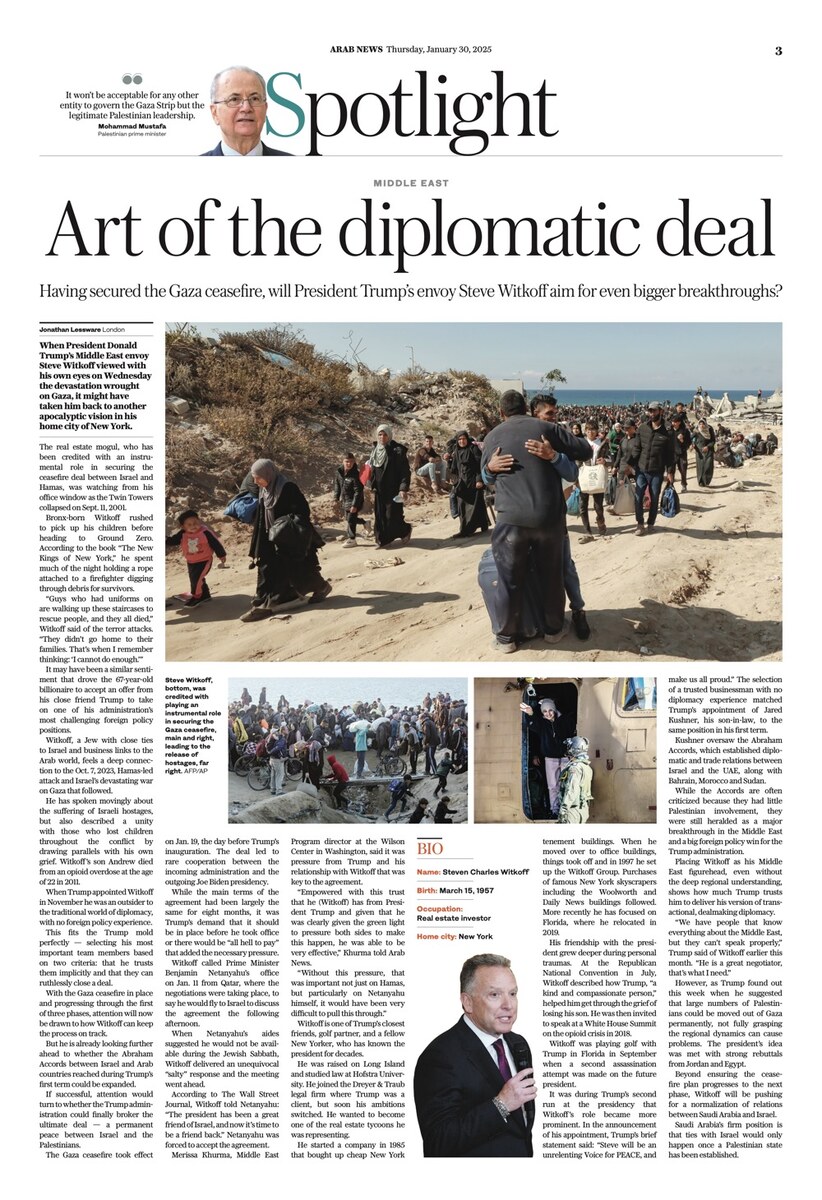LONDON: When President Donald Trump’s Middle East envoy Steve Witkoff viewed with his own eyes on Wednesday the devastation wrought on Gaza, it might have taken him back to another apocalyptic vision in his home city of New York.
The real estate investor and developer, who has been credited with an instrumental role in securing the ceasefire deal between Israel and Hamas, was watching from his office window as the Twin Towers collapsed on Sept. 11, 2001.
Bronx-born Witkoff rushed to pick up his children before heading to Ground Zero. According to the book “The New Kings of New York,” he spent much of the night holding a rope attached to a firefighter digging through debris for survivors.
“Guys who had uniforms on are walking up these staircases to rescue people, and they all died,” Witkoff said of the terror attacks. “They didn’t go home to their families. That’s when I remember thinking: ‘I cannot do enough.’”

Witkoff is one of Trump’s closest friends, golf partner and a fellow New Yorker, who has known the president for decades. (AFP)
It may have been a similar sentiment that drove the 67-year-old billionaire to accept an offer from his close friend Trump to take on one of his administration’s most challenging foreign policy positions.
Witkoff, a Jew with close ties to Israel and business links to the Arab world, feels a deep connection to the Oct. 7, 2023, Hamas-led attack and Israel’s devastating war on Gaza that followed.
He has spoken movingly about the suffering of Israeli hostages, but also described a unity with those who lost children throughout the conflict by drawing parallels with his own grief. Witkoff’s son Andrew died from an opioid overdose at the age of 22 in 2011.
A Middle Eastern diplomat told NBC News that Witkoff talked about his son during the ceasefire negotiations, telling officials he “empathizes with parents who have lost children on both sides.”
In remarks in New York on Sunday night, he said: “I’m always comparing my family and what it went through when I lost my boy, Andrew, and what it must have been like for these families not knowing what was going to happen to their girls.
“So, when the president asked me to do this, I thought to myself, this will be the most worthy thing I could ever do in my life. Nothing else would matter beyond this.”

Displaced Palestinians return to their homes in the northern Gaza Strip. (AP)
When Trump appointed Witkoff in November he was an outsider to the traditional world of diplomacy, with no foreign policy experience.
Yet, this fits the Trump mold perfectly — selecting his most important team members based on two criteria: that he trusts them implicitly and that they can ruthlessly close a deal.
With the Gaza ceasefire in place and progressing through the first of three phases, attention will now be drawn to how Witkoff can keep the process on track.
But he is already looking further ahead to whether the Abraham Accords between Israel and Arab countries reached during Trump’s first term could be expanded to include Saudi Arabia and other countries such as Qatar.
BIO
Name: Steven Charles Witkoff
Birth: March 15, 1957
Occupation: Real estate investor and developer
Home city: New York
If successful, attention would turn to whether the Trump administration could finally broker the ultimate deal — a permanent peace agreement between Israel and the Palestinians.
The Gaza ceasefire took effect on Jan. 19, the day before Trump’s inauguration. The deal led to rare cooperation between the incoming administration and the outgoing Joe Biden presidency.
While the main terms of the agreement had been largely the same for eight months, it was Trump’s demand that it should be in place before he took office or there would be “all hell to pay” that added the necessary pressure.
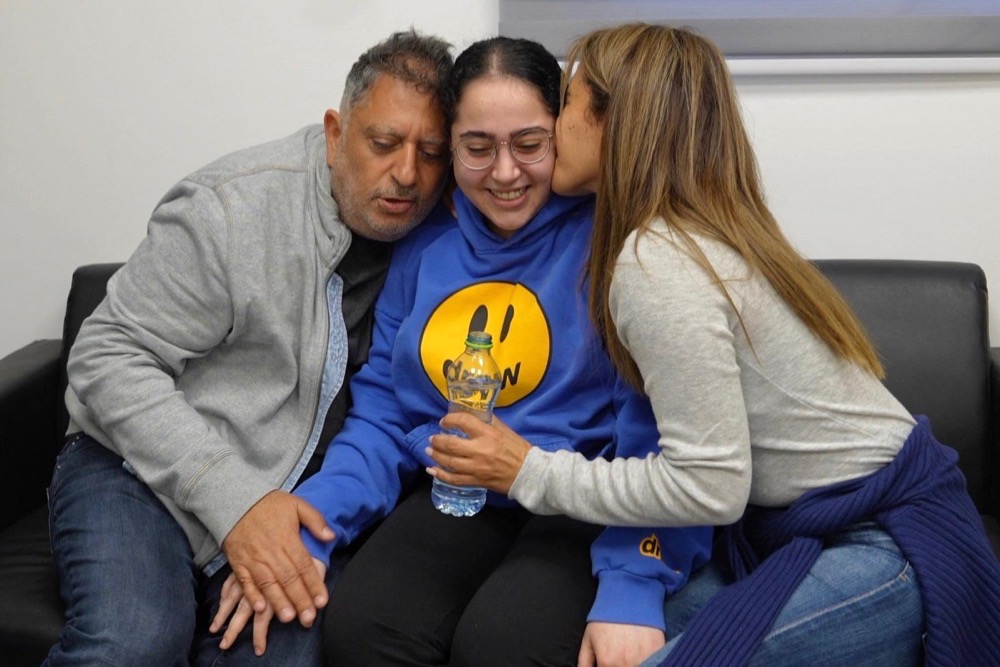
Liri Albag reunited with family at an army screening point in Reim in southern Israel. (AFP)
The man turning the screws on both sides was Witkoff.
As details of the deal emerged, so did Israeli media reports that Trump’s envoy had deployed his ruthless streak to get things over the line.
He called Prime Minister Benjamin Netanyahu’s office on Friday Jan. 11 from Qatar, where the negotiations were taking place, to say he would fly to Israel to discuss the agreement the following afternoon.
When Netanyahu’s aides suggested he would not be available during the Jewish Sabbath, Witkoff delivered an unequivocal “salty” response and the meeting went ahead.
According to The Wall Street Journal, Witkoff told Netanyahu: “The president has been a great friend of Israel, and now it’s time to be a friend back.” Netanyahu was forced to accept the agreement, bringing a halt to 15 months of fighting and starting a series of exchanges of Israeli hostages for Palestinian prisoners.
In a subsequent interview with Israel’s Channel 12, Witkoff said: “We had a discussion with the prime minister about how we needed to get focused in a short period of time and get organized so that we could get to the finish line.
“He convened what looked to me like maybe nine, 10, 11 of the top commanders in the Israeli armed forces. He gave direction to his team to be very proactive, and that was the difference maker.”
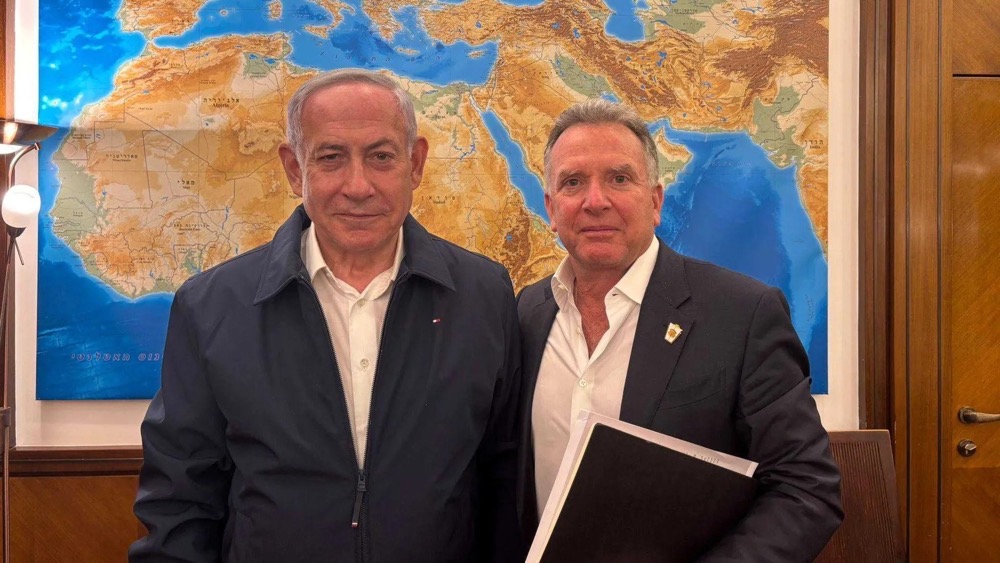
Netanyahu, left, was forced to accept the agreement, bringing a halt to 15 months of fighting and starting a series of exchanges of Israeli hostages for Palestinian prisoners. (Israeli PM’s office)
Merissa Khurma, Middle East Program director at the Wilson Center think tank in Washington, said that while Biden’s team also deserved credit, it was the pressure from Trump and his relationship with Witkoff that was key to getting the agreement done.
“Empowered with this trust that he (Witkoff) has from President Trump and given that he was clearly given the green light to pressure both sides to make this happen he was able to be very effective,” Khurma told Arab News.
“Without this pressure, that was important not just on Hamas, but particularly on Netanyahu himself, it would have been very difficult to pull this through.”
Witkoff is one of Trump’s closest friends, golf partner and a fellow New Yorker, who has known the president for decades.
He was raised on Long Island and studied law at Hofstra University. He joined the Dreyer & Traub legal firm where Trump was a client, but his ambitions switched — he wanted to become one of the real estate tycoons he was representing.
He started a company in 1985 that bought up relatively cheap New York tenement buildings, often doing maintenance work himself.
When he moved over to office buildings, things took off and in 1997 he set up the Witkoff Group. Purchases of famous New York skyscrapers including the Woolworth and Daily News buildings followed. More recently he has focused on Florida, where he relocated in 2019.
An indication of his business links with Arab countries came in 2023 when the Witkoff Group sold Manhattan’s Park Lane Hotel to the Qatari Investment Authority for $623 million.
Real estate associates described Witkoff as “smart, personable and a talented negotiator with a common touch,” the Journal reported.
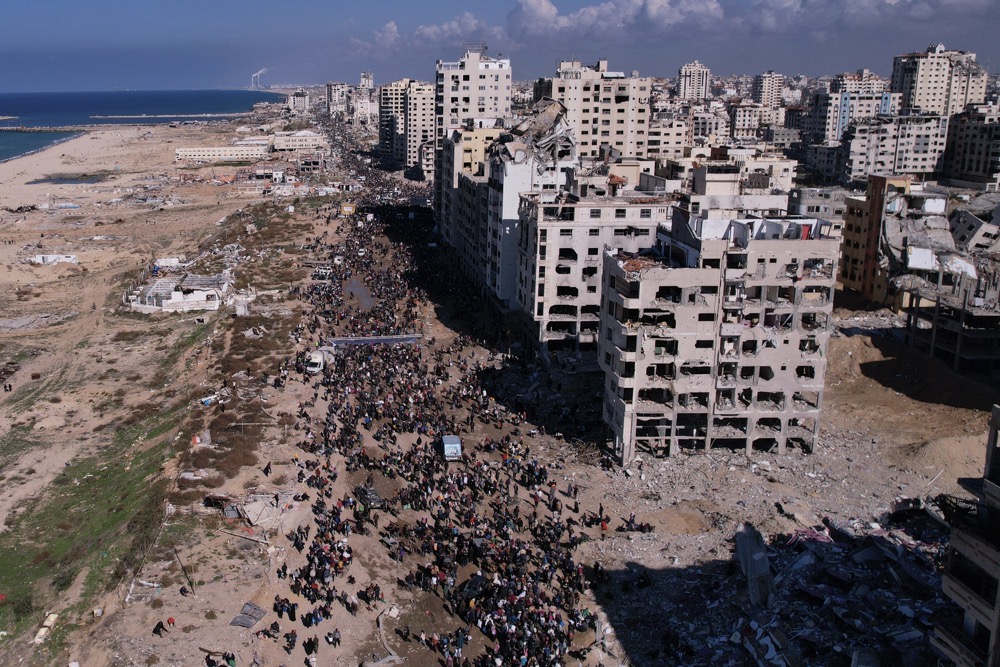
Witkoff was expected to be in Israel on Wednesday to oversee the implementation of the ceasefire in Gaza and inspect Israeli “corridors” carved through the territory. (AP)
His friendship with the president has grown deeper during personal traumas. At the Republican National Convention in July, Witkoff described how Trump, “a kind and compassionate person,” had helped him get through the grief of losing his son. He was then invited to speak at a White House Summit on the opioid crisis in 2018.
Witkoff was playing golf with Trump in Florida in September when a second assassination attempt was made on the future president.
It was during Trump’s second run at the presidency that Witkoff’s role became more prominent.
He was a key fundraiser, providing a link to wealthy Jewish donors and in an early test of his diplomatic skills he was deployed on several occasions to smooth things over between Trump and prominent Republicans.
In the announcement of his appointment, Trump’s brief statement said: “Steve will be an unrelenting Voice for PEACE, and make us all proud.”
The selection of a trusted businessman with no diplomacy experience matched Trump’s appointment of Jared Kushner, his son-in-law, to the same position in his first term.
Kushner oversaw the Abraham Accords, which established diplomatic and trade relations between Israel and the UAE, along with Bahrain, Morocco and Sudan.

Witkoff has spoken movingly about the suffering of Israeli hostages. (AFP)
While the Accords are often criticized because they had little Palestinian involvement, they were still heralded as a major breakthrough in the Middle East and a big foreign policy win for the Trump administration.
“This transactional nature of dealmaking works very well with the regional leaders, particularly in the GCC,” Khurma said.
They are not really threatened by Trump’s “America First” strategy, she added. They also want to see “the Middle East great again” and want to work toward that.
Placing Witkoff as his Middle East figurehead, even without the deep regional understanding, shows how much Trump trusts him to deliver his version of transactional, dealmaking diplomacy.
“We have people that know everything about the Middle East, but they can’t speak properly,” Trump said of Witkoff earlier this month. “He is a great negotiator, that’s what I need.”

Thousands of Palestinians have headed back to their homes in the north since a ceasefire deal was agreed. (AP)
However, as Trump found out this week when he suggested that large numbers of Palestinians could be moved out of Gaza permanently, not fully grasping the regional dynamics can cause problems. The president’s idea was met with strong rebuttals from Jordan and Egypt.
Beyond ensuring the ceasefire plan progresses to the next phase, Witkoff will be pushing for a normalization of relations between Saudi Arabia and Israel.
Saudi Arabia’s firm position is that ties with Israel would only happen once a Palestinian state has been established.
Witkoff was expected to be in Israel on Wednesday to oversee the implementation of the ceasefire in Gaza and inspect Israeli “corridors” carved through the territory.
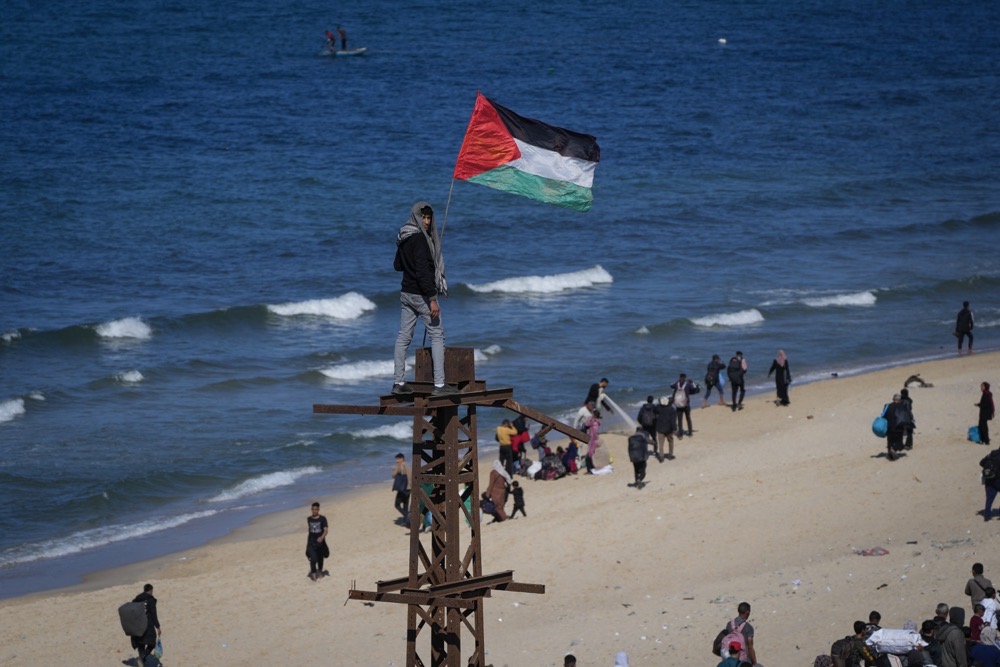
Placing Witkoff as his Middle East figurehead, shows how much Trump trusts him to deliver his version of transactional, dealmaking diplomacy. (AP)
There is already concern over whether the next phase of the ceasefire will hold, with Netanyahu under pressure from the hardline members of his government. Witkoff will have to deploy all of his boardroom nous to keep the fragile ceasefire, in a complex and devastating conflict, on track.
“The Middle East envoy does not necessarily understand all the different dynamics at play but it seems that he has good rapport with the Arab allies of the United States,” Khurma said.
“But they’re going to have to be confronted with a very delicate balancing act with regard to how they support Israel, but at the same time exert the necessary pressure to keep things moving.”
